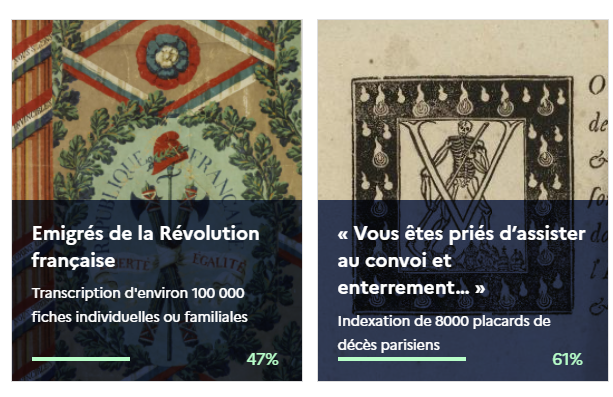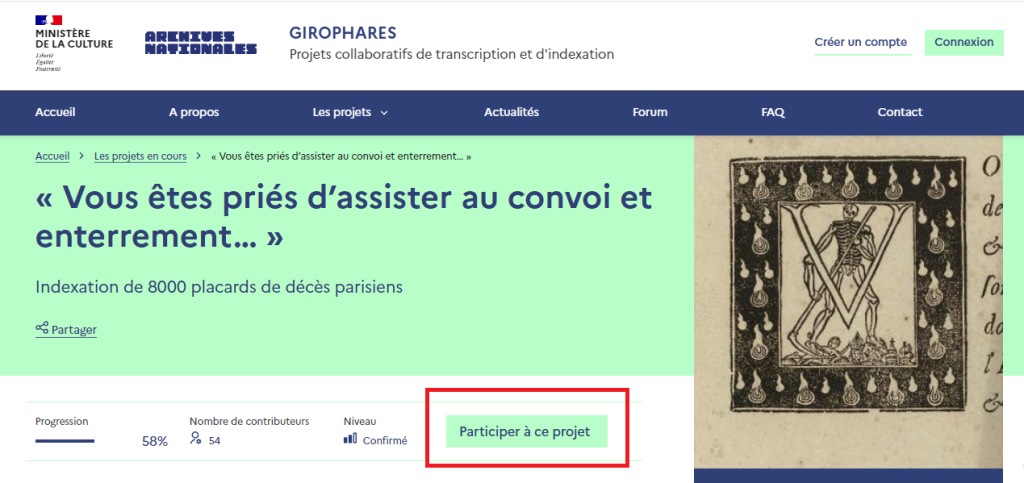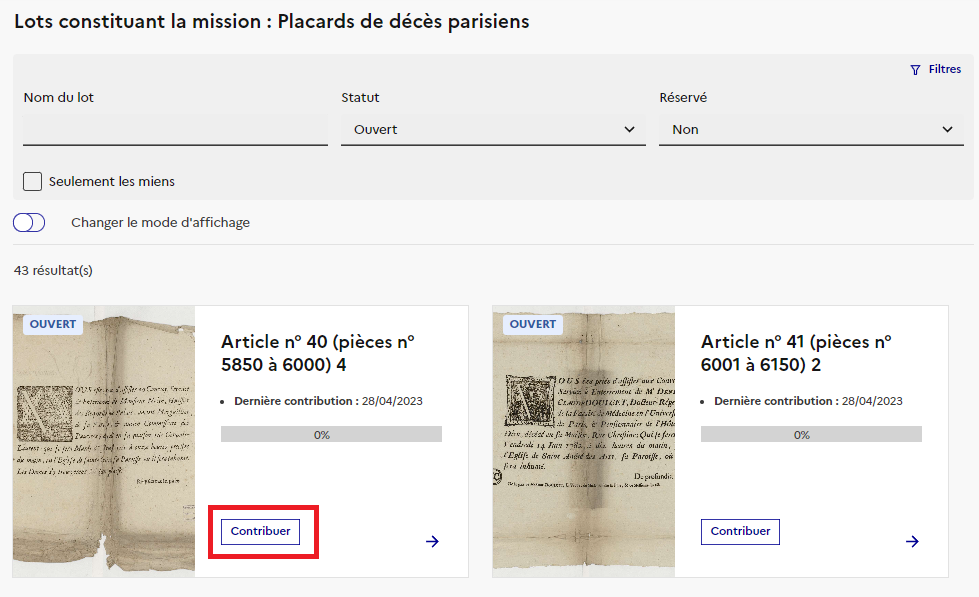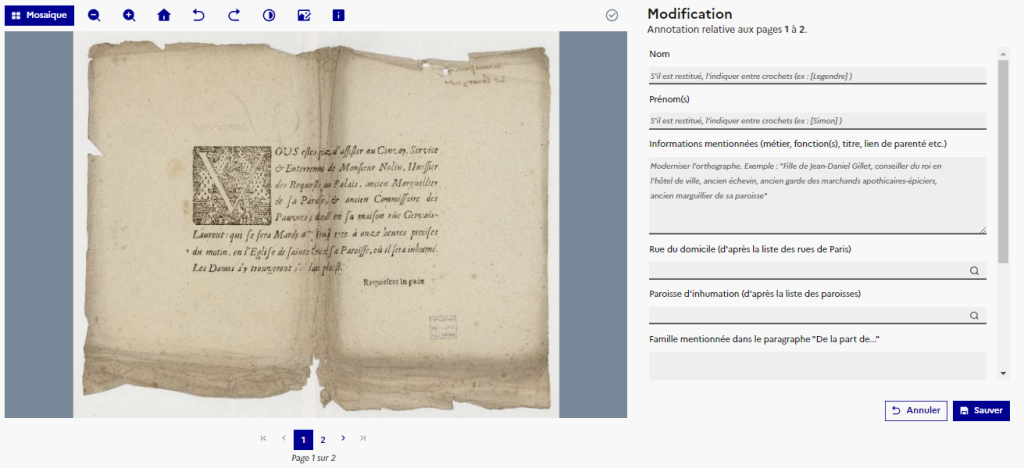Objectives
GIROPHARES is a collaborative indexing platform that enables everyone to contribute to improving the description of the archival fonds of the Archives nationales de France by describing digitized archival images.
Specific actions
Access the platform, find out about the various collaborative projects, view the digitized archives and index them according to a form previously set up by the archivists. Exchange information on the various projects with a network of volunteer contributors and enthusiasts.

 Project created
Project created
 Internationally
Internationally
Type of project : Online
Participation period : No commitment : depending on the contributor’s desired investment.
Level of involvement : Case by case
Project description
Context
The National Archives of France, an establishment of the Ministry of Culture, is the largest archive centre in Europe. As the memory of France, it preserves and makes available to the public the archives of the State since the Middle Ages, those of Parisian notaries and private archives of national interest.
Collecting, preserving, communicating, promoting understanding and highlighting their holdings, and encouraging young people to learn about citizenship – these are the fundamental missions of the National Archives.
In 2017, a blog called ‘Archives nationales participatives’ hosted on Hypotheses.org was created to propose the first collaborative transcription, annotation and indexing projects. Internet users wishing to contribute to one of these projects would contact the National Archives, which would send them batches of images to be indexed using a form. Several of these participatory projects have now been completed (Natnum, Testaments de Poilus, Ponts et Chaussées and La Communale). In order to simplify participation and to centralise the various participatory projects of the National Archives, the GIROPHARES platform was opened to the public in may 2023, allowing any volunteer to contribute directly to the platform as part of an open data approach.
Objectives
The National Archives of France hold several billion pages, several million of which have been digitised and put online. But how can you find a document quickly if it has not been accurately indexed? This is the ambition of the GIROPHARES collaborative platform: to enable everyone to contribute to improving the description of the collections held by the National Archives of France.
The GIROPHARES platform is a unique tool that enables users to find out about proposed collaborative projects, view the images, and index or transcribe them, using a form set up in advance by the archivists.
Ten projects have already been launched, from the 17th century to the 1940s:
- From the colonies to metropolitan France: indexing declarations of slaves and free people of colour in the 18th century (project completed in December 2023)
- ‘You are requested to attend the convoy and burial…’. indexing of 8,000 Paris death notices (project completed in June 2024)
- Emigrants during the French Revolution: indexing of 100,000 individual or family records (project completed in December 2024)
- Catholic ecclesiastics from 1881 to 1905: indexing of 80,000 individual records
- In the secrecy of the Council of King Louis XV: transcription of analyses of rulings by the King’s Council
- In the archives of the Court of Cassation: indexing of appeals before the Criminal Division of the Court of Cassation (1871–1910)
- Born or died at sea: indexation of the civil status records of the merchant navy (1872–1949)
- La Retirada, Spanish Republican exile: indexation of individual records of Spanish refugees in France (1939–1940)
- Serving notaries: indexation of the registration registers of notary clerks in Paris and the Seine department (1804–1860)
- In the House of the Emperor: indexation of the nominative file of imperial decrees and decrees of the House of the Emperor during the Second Empire.
For each project, the progress of contributions, the number of contributors and the level of complexity (beginner, confirmed, expert) are indicated.
The volunteers’ indexations are then proofread and standardised by the archivists and published in the form of finding aids in the Virtual Reading Room of the National Archives.
How to participate
Join the community and help make the resources of the National Archives of France better known and more accessible!
Anyone can contribute, however modestly. You don’t necessarily need to have studied history or be a specialist in a particular field: each archive collection proposed is the subject of a presentation, and a help sheet explains how to index or transcribe the documents, explains the abbreviations encountered or directs you to other online resources.
- Create an account on the GIROPHARES platform.
- Choose from the projects on offer and reserve the batch of images you wish to describe.
GIROPHARES has been designed to be accessible to as many people as possible. Its simple, intuitive interface makes it easy to learn. If you have any questions or problems, there are video tutorials (creating an account, reserving a batch of images, using the viewer for indexing) and an FAQ available on the platform. The project managers and the community are also there to help you.
The platform offers a forum, a place for discussion between contributors and with archivists. You can share your discoveries, ask questions about the meaning of a particular abbreviation, ask for help in identifying a place or reading ancient writings.
Resources
Presentation and demonstration of GIROPHARES by Romain Le Gendre, curator at the French National Archives, as part of Genealogy Week 2023 organised by the French Genealogy Federation (girophares.archives-nationa…
The participation
 Training required
Training required
No training is necessar y: everyone is free to sign up and participate in GIROPHARES projects. Tutorials on how to use the tool are available, and each project includes a data entry help sheet listing the instructions and main abbreviations likely to be encountered.
 Required equipment
Required equipment
You need a computer, an Internet connection and an e-mail address to create an account.
Co-managers
Zoé Navarrete
Responsable de la plateforme GIROPHARES
Archives Nationales
Direction des fonds







